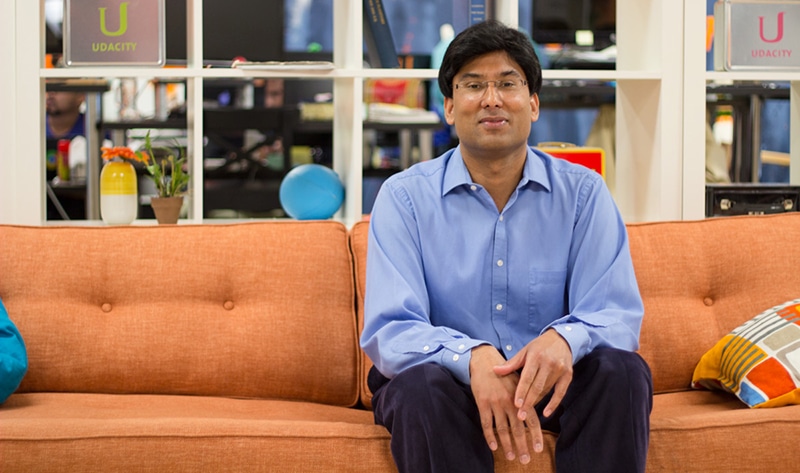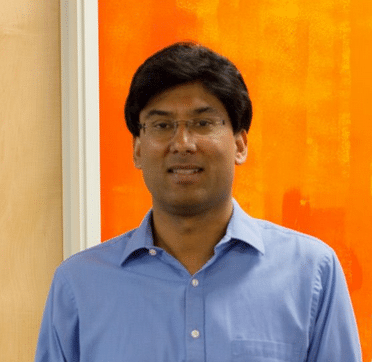Today’s post is from Front-End student (graduated as of April 16) Rohit Gupta, who’s bounced from engineering to marketing to being an aspiring coder who simply never stops learning.
I remember when I was working at Morgan Stanley as a financial advisor. Around that time, a friend of mine came to me with an idea for a company. But neither of us could code. We did have one other friend who could code, but he felt what we were trying to do was too daunting and he didn’t want to help. Personally, I thought we had a great idea, but because of our lack of programming ability, it just slipped away.
So I decided that I was going to learn to program.
…the moment I updated my LinkedIn profile with my Nanodegree projects, recruiters starting reaching out to me.
I started taking courses online, and what I found out about the online learning experience is that I really liked learning in small bites. You’re always learning and doing at the same time—there’s no two-hour lecture to remember and re-parse through once you’re actually doing the work. So I started Intro to Computer Science at Udacity, but it was at the same time I got my job at Morgan Stanley. Needless to say, I got so busy with my career that I didn’t follow through with the course.
When I found out about the Front-End Nanodegree, it seemed to offer what I was looking for, so I decided to enroll. My motivation was primarily our personal project, but I was also looking for a job. So initially, I wanted to hone my skills to eventually land myself a new job with the potential to freelance and build my own stuff.
I’m a mechanical engineer, and in the past I worked for semiconductor companies. But around 2008, the whole thing collapsed and there was nothing for me to do from an engineering point of view. In terms of computing, chip speed wasn’t doubling like it used to in the 90s. The growth is so much smaller.
Then I joined Palm as a strategic marketer, and at the time the company was growing like crazy. And we all know how that turned out. I moved to a startup shortly after, which also shut down in the near future.
At Udacity, there is a rubric. There are office hours. You can get one-on-one time with a coach. The program is flexible, unlike most bootcamps
The weird thing is that even though my original goal was to build a startup, I couldn’t find enough programmers that actually wanted to code. So that was a big inspiration for learning to code myself. The best thing for me, I figured, was to learn to program. And that would lead to something. That was my premise.
Around 2012 was when I first discovered Udacity, and shortly after that I started taking Intro to CS. But again, because of my job at the time, I didn’t finish the class.
And now in April 2015, I just completed the Front-End Nanodegree, and I’m very happy with it. I’ve taken courses on other sites, but I feel as if they haven’t quite figured out the equation. At Udacity, there is a rubric. There are office hours. You can get one-on-one time with a coach. The program is flexible, unlike most bootcamps. Plus, courses get upgraded. I have no complaints at all. My biggest challenge was learning JavaScript because I had no experience with it at all, so I’ve had to go back and re-watch parts of the courses.
What’s interesting is that the moment I updated my LinkedIn profile with my Nanodegree projects, recruiters starting reaching out to me. I ended up applying for jobs and went through with an interview just for the experience, to see what kind of questions I would get. They asked me three questions: one was about scope, the second was to draw a responsive flow, and the third was an algorithm question. This gave me a little more insight into the type of things I need to learn. When I went back and looked at the Udacity Nanodegree, I saw that all these topics were covered. But I did need to go outside of Udacity to get comfortable with some stuff, but going back to Udacity courses, I realized they hit on most of what I needed.
Slowly I started understanding and now I feel that because of Udacity, I’ve become a programmer. Overall, I’m very happy.
Going out on interviews early was something I was unprepared for, but I’m really glad I did it. Not only do you get some insight into the types of questions you’ll be asked, but it gives you the chance to ask companies any question that you want. For example, I interviewed with a couple of tech companies and I got to see the type of code they were using, and specifically at one company, they weren’t using any frameworks or Bootstrap. They didn’t do Jasmine testing or any optimization. In a sense, seeing these things in the real world gave me more confidence, and I felt like I was already ahead of the game.
The Nanodegree itself was definitely challenging, though. I didn’t have much experience or knowledge of programming with the exception of HTML. I didn’t know anything about CSS, JavaScript and beyond. Slowly I started understanding and now I feel that because of Udacity, I’ve become a programmer. Overall, I’m very happy.
Now that I have graduated from the Front-End Nanodegree, I’m going to move to the next Nanodegree. My goal is to continue to learn more and go more in-depth in JavaScript in the short term. I’m most likely going to enroll in the iOS Nanodegree next and just continue to grow my list of skills. I also participated in an awesome hackathon sponsored by Udacity and Firebase, and built an app with Angular and Firebase in just a few hours. Udacity is truly Udacious for its students!
I’m not afraid to learn anything new, and I’ve been that way my entire life. From grad school, where I got a Ph.D. in engineering, to the semiconductor and mobile industries, to strategic marketing to finance, and now coding—I’m always happy to jump in and learn.
Want to share your Udacity story? We want to hear from you! Drop us a line at social@udacity.com.




